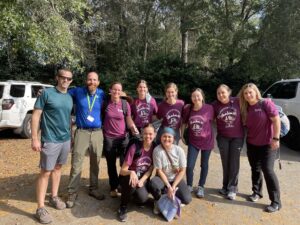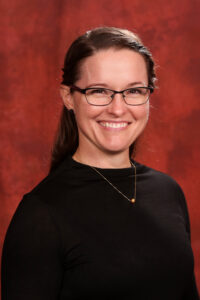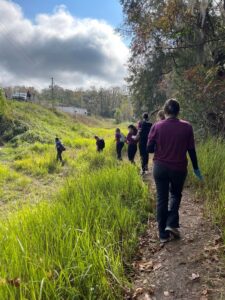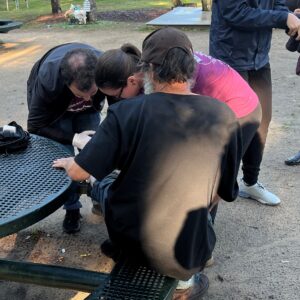Sponsored Content
How Physician Associates Can Qualify for Student Loan Forgiveness
December 10, 2024
“We become better clinicians by getting these perspectives.”
January 8, 2024
By Jennifer Walker

At Florida State University (FSU), students in the PA and medical programs, as well as pre-PA students, are providing care to the unsheltered population in Leon County, Florida, through the Homeless Outreach Medicine & Education (HOME) Street Medicine Program. To provide this care, which includes vital screenings and wound care, small teams of students along with a licensed faculty member enter encampments in the deep woods where the program’s unsheltered patients have made their homes.
With this program model, said Allison Justice, PA-C, faculty advisor for the HOME Street Medicine Program and assistant professor in FSU’s School of Physician Assistant Practice, “You have a medical team coming out of their comfortable spaces to go into these encampments and say, ‘We care about you.’ This creates positive perceptions of healthcare. We are then able to bridge this gap in care for this population and impact lives.”

The HOME Street Medicine Program was founded in 2022 by Christina Hofman, then an FSU PA student, who got the idea for this initiative from her experience working with unsheltered populations at a clinic in the Florida Panhandle. Collaboration is a key component of the program, and FSU students and faculty work closely with the Kearney Center, the largest emergency service center for the homeless population in Leon County, as well as the Leon County Sheriffs’ Office, to connect with unsheltered patients.
In less than two years, the HOME program has received about $7,000 in funding, which includes both individual donations, as well as a $2,500 Be the Change Grant from the nccPA Health Foundation and a $1,700 grant from the PA Foundation. Justice estimates the program has made 500 to 1,000 encounters with unsheltered patients, which includes care provided at community events.
The HOME program also focuses on building relationships and trust with the unsheltered community. The goal is for this population to be comfortable seeking care at hospitals and clinics when they need it, said Samantha Mankus, a PA student at FSU and president of the HOME Street Medicine Program.
“A lot of times, the unsheltered population feels uncomfortable seeking care because they feel judged,” added Mankus. “Even if they’re not comfortable receiving medical care from us, we still go to the encampments to build rapport with the community and to let them know that we are here for them if they need us. By us going to them, we are hoping to break down that barrier and encourage them to feel more comfortable seeking care in the future.”
The Home Street Medicine Program Model
In her work with the HOME Street Medicine Program, Mankus remembers one patient, a veteran, who didn’t have his birth certificate, driver’s license, or social security card—documents that he would need to obtain medical care through the Veterans Health Administration. The HOME team had regularly been providing basic vital screenings and diabetic wound care on this patient’s foot. When he developed an infection, this prompted him to go to the hospital, where he was able to get his identifying documents and was ultimately given the opportunity to move into housing.

“That was a rewarding experience for us,” said Mankus. “His wound care is obviously going to be managed better now that he is not in a wet and damp setting. And as a veteran, he should have access to benefits, but he didn’t. We were able to supplement his wound care while the social worker got all of his documents squared away.”
There are 269 unsheltered individuals in Leon County—a 60% increase from the previous year—as well as 40 encampment locations, according to a 2023 report on homelessness from the Leon County Board of County Commissioners. Many of the unsheltered individuals who have been served by the HOME Street Medicine Program are veterans. Some also face substance use disorder or mental health diagnoses, and all struggle with accessing specialist care due to lack of funds for co-pays.
Students and faculty volunteers from FSU connect with this population about twice a month. The HOME Street Medicine Program has a large pool of potential volunteers—the roster includes 60 first-year PA students, 60 second-year PA students, and 120 medical students, along with interested pre-PA parties—but only a maximum of five people attend each round. Each team includes a licensed faculty member, as well as one to two PA students, medical students, and pre-PA volunteers.
Once the volunteer team is established and a date is set, the HOME program connects with its unsheltered patients with the help of social workers from the Kearney Center. “They establish which encampments need medical attention, and they pre-plan a route for us,” said Mankus, who spent three years working as a certified nurse assistant before starting the FSU PA program.
On the day of rounds, the HOME volunteer team and the Kearney Center social worker take into consideration how they will approach each encampment in the woods. These encampments are usually located five to 30 minutes from FSU, so the group will carpool to prevent drawing attention and exposing unsheltered individuals’ locations.
After they park, the team grabs their supplies: a small medical bag with gauze, a blood pressure cuff, and a thermometer, as well as items they can provide to patients, such as cereal bars, hygiene supplies, insect repellent, shoes, sleeping bags, tarps and tents, water, and winter coats. As they approach each encampment, the team announces themselves by calling out “Kearney Center” or “Home Street Medical Team.” Then they ask unsheltered individuals if they can come into their space to chat.

“We’re quiet and we respect their privacy,” added Mankus. “We understand that this is their home, and it’s a privilege to be able to enter into it.”
If patients want to talk, students take vital signs and provide basic wound care if needed, and they have the ability to check blood sugars. They also spend about 15 to 20 minutes chatting to build that rapport. Each day of rounds takes about three to four hours, and the team sees about three to eight patients during that time.
Despite the fact that the team is offering medical services, Justice said the goal is not for students to become primary care providers to this population. “Clients are encouraged to establish their own primary care clinician for follow up,” added Justice, who was a flight medic with the Florida National Guard, with whom she did two tours in Iraq, before becoming a PA. “We have a lot of really wonderful neighborhood medical clinics, and we’re able to make recommendations for where they can go for advanced medical care.”
If patients do not want to receive medical care, the HOME team still offers them any supplies they need. “Our supplies are not conditional on them seeking care, and we provide care to anyone without judgment or incentives,” Mankus said.
The HOME team also provides care to unsheltered individuals they meet through the Leon County Sheriffs’ Office Homeless Outreach Street Team (HOST). For example, deputies from HOST might call the HOME program because they have a patient who doesn’t have the money to get a prescription filled. The HOME team can’t fill the prescription, but they can sometimes provide funds so the patient can get the prescription filled at a pharmacy.
Justice admits she thought the HOME Street Medicine Program might fade away as PA and medical students adopted other interests. But the students remain fiercely committed to supporting the unsheltered population. “Their passion is constantly growing for this program, despite the amount of work they have. I am extremely proud of them.”
Gaining New Perspectives
 Justice has big goals for the HOME Street Medicine Program, including expanding the medical services that the team can offer. “There’s things we can treat and prescribe and dispense for this population,” she said, adding that the team could eventually provide treatment for skin infections, remove stitches, offer more advanced wound care, and prescribe and dispense blood pressure medications and antibiotics. “We also have this pipe dream of having a mobile bus in the future.”
Justice has big goals for the HOME Street Medicine Program, including expanding the medical services that the team can offer. “There’s things we can treat and prescribe and dispense for this population,” she said, adding that the team could eventually provide treatment for skin infections, remove stitches, offer more advanced wound care, and prescribe and dispense blood pressure medications and antibiotics. “We also have this pipe dream of having a mobile bus in the future.”
For now, the benefits of this program are extending to student and faculty volunteers. “Being a provider, it’s really important to have compassion for your patients. It allows you to treat them better,” said Mankus, who plans to specialize in emergency medicine or general surgery. “I stress that the volunteers listen to the stories that our patients tell us and learn as much as they can from this experience. It’s not always about learning physical healthcare skills. It’s about learning more about this population.”
Justice is already taking the lessons learned through this program and applying them to her practice as a PA. “In the emergency department, it’s easy to start building thoughts about certain patient populations. That’s just human nature,” she said. “This program has really helped me transform and change those thoughts as a clinician, which is a huge blessing. We become better clinicians by getting these perspectives.”
Jennifer Walker is a freelance writer in Baltimore, MD. Contact Jennifer at [email protected].
You Might Also Like
Patient-Provider Trust is Key for Street Medicine PA Sam Halajian
2022 PA of the Year Cares for Patients Experiencing Unsheltered Homelessness
Street Medicine: PAs Deliver Healthcare to the Homeless
PA Student Kaleo Lee and Classmates Start a Donation Drive to Support Those Affected by the Maui Fires in Hawaii
You have 2 articles left this month. Create a free account to read more stories, or become a member for more access to exclusive benefits! Already have an account? Log in.